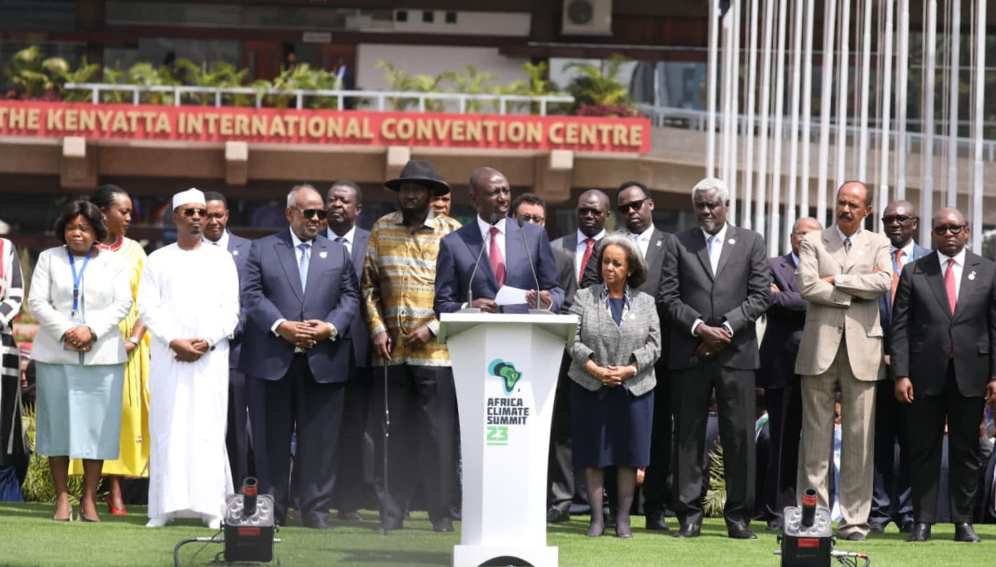By: Gilbert Nakweya
Send to a friend
The details you provide on this page will not be used to send unsolicited email, and will not be sold to a 3rd party. See privacy policy.
[NAIROBI] Commitments made at the first Africa Climate Summit, which will form the basis of talks at COP28 later this year, failed to address adequately the challenges facing the continent’s army of smallholder farmers, civil society groups told SciDev.Net.
At the summit in Nairobi last week (4–8 September) African leaders called on the international community to honour previous commitments to provide $100 billion in annual climate finance, phase out fossil fuels, and establish a loss and damage facility.
The so-called “Nairobi Declaration” also included commitments to driving forward Africa’s green economy and expanding renewable energy generation as well as proposing a new global tax regime to finance climate action at scale.
But civil society groups, who simultaneously held a separate “Peoples Climate Summit” in the Kenyan capital, criticised the statement for its lack of concrete commitments to help farmers become more climate-resilient.
Nnimmo Bassey, director of the Health of Mother Earth Foundation in Nigeria, told SciDev.Net: “We are particularly shocked that despite the declaration acknowledging that 60 per cent of the population are smallholder farmers, very little is said about supporting them and nothing is said of enhancing the practice of agroecology, which is a real climate solution.”
Enock Chikava, interim director of agricultural development at the Bill & Melinda Gates Foundation, said smallholder farmers had the potential to lift millions of people out of poverty, foster food security, create jobs and help the continent adapt to climate change.
He said global investment was urgently needed but “investing in Africa is seen as a risk because of lack of understanding of the continent”.
“What Africa is telling industrialised countries is, please listen to us,” he added.
“With our agricultural produce having reduced, we require radical way to reverse this and increase productivity through innovations such as drought tolerant seeds,” Chikava explained.
Eyes on COP28
The Nairobi Declaration and call to action are expected to form the basis of negotiations at the next major UN climate summit, COP28, in Dubai, United Arab Emirates (UEA) in November.
During the Africa Climate Summit, investors from UAE committed to buying $450 million of carbon credits from the Africa Carbon Markets Initiative, which was launched at Egypt’s COP27 summit last year.
African leaders said that equal access to cheap business capital, a carbon tax on fossil fuel trade, and debt relief for Africa would speed up action to fight climate change.
COP28 President Sultan Al Jaber said Africa received 12 per cent of the US $250 billion needed annually to meet Africa’s climate finance needs, with less than two per cent going to adaptation.
“This is neither just nor equitable…and it is a big, missed opportunity,” Al Jaber told the summit.
The declaration says that the loss and damage fund agreed at COP27 must be implemented to compensate climate vulnerable communities for the irrevocable damage caused by climate change.
It also proposes a new financing architecture that allows for debt restructuring and relief and the development of a new Global Climate Finance Charter through UN General Assembly and COP processes by 2025.
African countries are asking for debt forgiveness and longer loan terms, including a 10-year grace period, to help the continent deal with the climate crisis and meet development goals.
Kenya’s President, William Ruto, told the summit that, while Africa’s carbon footprint remained small, the impacts of climate change on the continent were disproportionately high.
“The urgency to address loss and damage, and to configure appropriate financial mechanisms for resilience, grows with each extreme weather event and each bout of climate-induced insecurity,” Ruto said.
Ruto, who is the chairman of the Committee of African Heads of State and Government on Climate Change, said the cost of climate change adaptation was growing amid rising living costs, and added: “[…] the cost of development capital for African economies remains prohibitive.”
African Development Bank President Akinwumi Adesina urged developed economies to meet their USD $100 billion per year target for climate action in developing countries and reconfigure the financial architecture to address the challenges facing Africa.
This piece was produced by SciDev.Net’s Sub-Saharan Africa English desk.
















